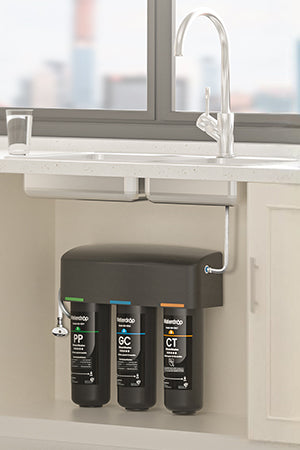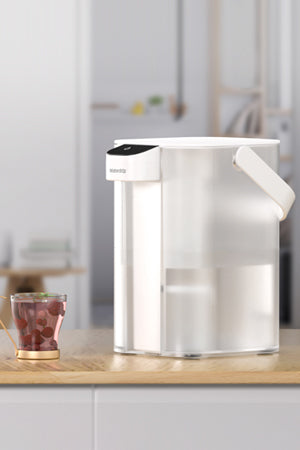Singapore has one of the globe's purest systems for providing clean water. However, households continually question if their tap water is pure enough for daily use, for cooking, and for drinking.
Even though Singapore's tap water meets world safety standards, it can still pick up contaminants. This can happen as the water travels through pipelines, storage tanks, and building fittings. That is why numerous Singaporeans wish to treat their tap water one more time at home.
In this article, we will explain different ways to purify tap water. We will discuss the benefits of each method and identify the best one. We will also answer the most common questions about water purification.
Why Should Singaporeans Treat and Sanitize Tap Water?
Although
PUB (Singapore National Water Agency) guarantees the quality of water, there can still be problems:
- Older pipes and tanks – Corrosion, sediment, or biofilm can be brought into your faucet water.
- Chlorine taste and smell – Used for disinfecting, but it is known to leave an off-flavored deposit.
- Heavy metals – Occasionally, older plumbing can leach small amounts of lead or copper.
Home security is important. Parents with babies, elderly family members, or those with sensitive stomachs may want extra protection. Faring your tap water at home enables you to be sure what you consume is pure, healthy, and delicious-tasting.
How Can I Purify My Tap Water?
There are several methods for Singaporean households. Let’s consider the most common ones.
1. Boiling Water
Boiling is the oldest and simplest method for purifying water.
How it works: Boiling for 1–3 minutes kills off bacteria, viruses, and parasites.
Benefits: Affordable, effective against microbes
Cons: Does not eliminate chlorine, heavy metals, or chemical pollutants. Energy and time-consuming process.
Tips: Best for emergency situations and not ideal for everyday drinking water.
2. Utilizing Activated Carbon Filters
These are common on faucet attachments and pitcher filters.
How it works: It removes chlorine, odors, and certain chemicals.
Advantages: Enhances flavor and aroma, affordable.
Cons: Limited filtration. Does not remove fluoride, heavy metals, or dissolved solids. Needs frequent replacement.
Tips: Not very good for purification, but good for the environment.
3. Reverse Osmosis (RO)
Reverse osmosis is perhaps the most efficient technology for cleaning water.
How it works: Water is pushed through a semi-permeable membrane that removes as much as 99% of impurities, like heavy metals, chlorine, bacteria, viruses, dissolved solids and microplastics.
Advantages: Offers pure, clean, and sanitary water. Can eradicate very small impurities. Most suited for families who need complete protection.
Cons: Higher initial cost, needs installation.
Tips: Best alternative for Singapore home owners who want stable and long-term healthy drinking water.
4. Distillation
This method involves boiling water and collecting the condensed steam.
How it works: Removes most impurities.
Advantages: Removes an enormous spectrum of impurities.
Cons: Dear, slow, strips minerals, and not usable day-to-day.
Tips: Not more appropriate for laboratory or medicinal usage than for home kitchens.
5. UV Water Purifiers
How it works: Eliminates bacteria and viruses with ultraviolet light.
Benefits: Kills germs, chemical-free.
Cons: Does not remove chemicals, metals, or solids.
Tips: Best used as the last layer for purification.
Best Water Purification Method In Singapore
For households in Singapore, the most comprehensive protection is through reverse osmosis (RO) filtration of water. Although boiling or standard carbon filters are of help, they will not eliminate everything. RO filters work best on:
- Heavy metals (lead, mercury, arsenic)
- Chlorine and chloramine
- Fluoride
- Microplastics
- Bacteria and viruses
- Pesticides and industrial contaminants
This makes RO the healthiest way of treating tap water for drinks and kitchen purposes.
Why Waterdrop Water Filters Singapore?
Not all systems are created equal for RO filtration. Many Singapore families prefer Waterdrop for longevity of health, convenience, and peace of mind. Waterdrop reverse osmosis water filters stand apart for the following reasons:
- State-of-the-art filtration – Removes up to 99% of toxins and preserves healthy minerals.
- Tankless design – Saves space and reduces bacterial growth in storage tanks.
- Running waters – Provides pure water instantly.
- Smart monitoring – Gives you a reminder for replacing filters.
- Eco-friendly – Produces less wastewater than traditional RO systems.
People Also Asked Questions
Can we drink tap water in Singapore?
In fact, Singapore’s tap water is pure since it meets worldwide
WHO standards . However, there could be pollutants from pipes within buildings, and therefore many locals utilize additional purification processes like RO filters.
Does boiling tap water make it safe for consumption?
Boiling kills off bacteria and viruses but not chemicals, heavy metals, or chlorine. It creates greater safety but does not offer complete purification.
What is the healthiest way to filter tap water?
The healthiest method is a
reverse osmosis system , which removes nearly all impurities and actually improves flavor and mouthfeel.
Are water filters for Singapore worth it?
Yes. Even though the tap water is pure where it is produced, filters provide added protection, more particularly within households where there are children, the elderly, or sensitive-to-chlorine individuals.
Bottled or filtered tap water: which is the superior option?
Filtered tap water is cheaper, better for the environment, and safer. Bottled water is expensive and produces plastic waste. Tap water is the wiser choice with a decent filtration system.
Takeaway
Singapore tap water filtration isn't just about safety—it’s about the boost of flavor, health, and peace of mind. In spite of the usefulness of boiling and activated filters, the real answer happens to be reverse osmosis filtration.
For households that want pure, clean, and safe drinking water every day, Waterdrop filters provide a cutting-edge, sustainable, and affordable option. If you consider purifying your tap water, one of the best decisions for the health of your family is to purchase a Waterdrop RO system.





































































